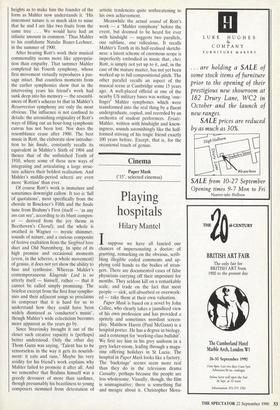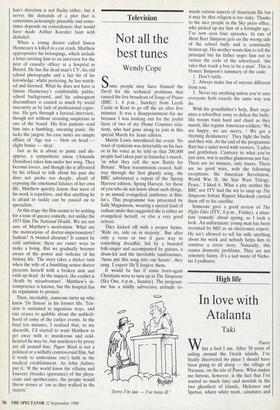Cinema
Paper Mask ('15', selected cinemas)
Playing hospitals
Hilary Mantel
Isuppose we have all fancied our chances of impersonating a doctor: of grunting, remarking on the obvious, scrib- bling illegible coded comments and ap- plying cold hands to the bodies of stran- gers. There are documented cases of false physicians carrying off their imposture for months. They seldom kill on a remarkable scale, and trade on the fact that most people — sick, self-absorbed or overwork- ed — take them at their own valuation.
Paper Mask is based on a novel by John Collee, who clearly takes a jaundiced view of his own profession and has provided a spritely and sometimes mordant screen- play. Matthew Harris (Paul McGann) is a hospital porter. He has a degree in biology, and a contempt for 'working-class bullshit'. We first see him in his grey uniform in a grey locker-room, leafing through a maga- zine offering holidays in St Lucia. The hospital in Paper Mask looks like a factory. The 'backstage' scenes seem more real than they do in the television drama Casualty, perhaps because the people are less wholesome. Visually, though, the film is unimaginative; there is something flat and meagre about it. Christopher Mora-
han's direction is not flashy either, but it serves the demands of a plot that is sometimes sickeningly plausible and some- times depends on coincidences that would have made Arthur Koestler faint with disbelief.
When a young doctor called Simon Hennessey is killed in a car crash, Matthew appropriates his belongings, which include a letter inviting him to an interview for the post of casualty officer at a hospital in Bristol. He has the dead man's CV, his old school photographs and a fair bit of his knowledge; whilst portering, he has watch- ed and listened. What he does not have is Simon Hennessey's comfortable public- school background, and his subsequent discomfiture is caused as much by social insecurity as by lack of professional exper- tise. He gets through a farcical interview, though not without arousing suspicions in one of the board. His first patients send him into a fumbling, sweating panic. He lacks the jargon; his case notes are simple affairs of 'Age ten — blow on head — slight bruise — okay'.
Just as he is about to panic and dis- appear, a sympathetic nurse (Amanda Donohoe) takes him under her wing. They become lovers, and though she is affronted by his refusal to talk about his past she does not probe too deeply, afraid of exposing the emotional falsities of her own life. Matthew quickly learns that most of his work is repetitive, and that anything he is afraid to tackle can be passed on to specialists.
At this stage the film seems to be settling for a tone of queasy comedy, not unlike the 1973 film The National Health. We are not sure of Matthew's motivation. What are the motivations of doctor-impersonators? Sadism? A twisted altruism? It cannot be cold ambition; there are easier ways to make a living. But we gradually become aware of the power and violence of his fantasy life. The story takes a darker turn when the wife of a bumbling senior doctor presents herself with a broken arm and ends up dead. At the inquest, the verdict is 'death by misadventure'. Matthew's in- competence is known, but the hospital has its reputation to protect.
Then, inevitably, someone turns up who knew `Dr Simon' in his former life. Ten- sion is sustained in ingenious ways, and one ceases to quibble about the unlikeli- hood of some of the earlier events. In the
final ten minutes, 1 realised that, to my
discredit, I'd started to want Matthew to get away with it; murderous and cold- hearted he may be, but murderers by proxy
are all around him. Paper Mask is not a political or a wilfully controversial film, but
it tends to undermine one's faith in the medical establishment. As John Aubrey put it, 'If the world knew the villainy and knavery (besides ignorance) of the physi- cians and apothecaries, the people would throw stones at 'em as they walked in the streets.'



































































 Previous page
Previous page